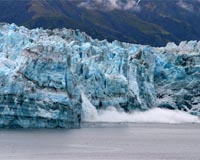| . |  |
. |
Vancouver BC (SPX) Dec 10, 2010 Sudden changes in the volume of meltwater contribute more to the acceleration - and eventual loss - of the Greenland ice sheet than the gradual increase of temperature, according to a University of British Columbia study. The ice sheet consists of layers of compressed snow and covers roughly 80 per cent of the surface of Greenland. Since the 1990s, it has been documented to be losing approximately 100 billion tonnes of ice per year - a process that most scientists agree is accelerating, but has been poorly understood. Some of the loss has been attributed to accelerated glacier flow towards ocean outlets. Now a new study, to be published tomorrow in the journal Nature, shows that a steady meltwater supply from gradual warming may in fact slow down glacier flow, while sudden water input could cause glaciers to speed up and spread, resulting in increased melt. "The conventional view has been that meltwater permeates the ice from the surface and pools under the base of the ice sheet," says Christian Schoof, an assistant professor at UBC's Department of Earth and Ocean Sciences and the study's author. "This water then serves as a lubricant between the glacier and the earth underneath it, allowing the glacier to shift to lower, warmer altitudes where more melt would occur." Noting observations that during heavy rainfall, higher water pressure is required to force drainage along the base of the ice, Schoof created computer models that account for the complex fluid dynamics occurring at the interface of glacier and bedrock. He found that a steady supply of meltwater is well accommodated and drained through water channels that form under the glacier. "Sudden water input caused by short term extremes - such as massive rain storms or the draining of a surface lake - however, cannot easily be accommodated by existing channels. This allows it to pool and lubricate the bottom of the glaciers and accelerate ice loss," says Schoof, who holds a Canada Research Chair in Global Process Modeling. "This certainly doesn't mitigate the issue of global warming, but it does mean that we need to expand our understanding of what's behind the massive ice loss we're worried about," says Schoof. A steady increase of temperature and short-term extreme weather conditions have both been attributed to global climate change. According to the European Environment Agency, ice loss from the Greenland ice sheet has contributed to global sea-level rise at 0.14 to 0.28 millimetres per year between 1993 and 2003. "This study provides an elegant solution to one of the two key ice sheet instability problems identified by the Intergovernmental Panel on Climate Change in their 2007 assessment report," says Prof. Andrew Shepherd, an expert on using satellites to study physical processes of Earth's climate, based at the University of Leeds, the U.K. "It turns out that, contrary to popular belief, Greenland ice sheet flow might not be accelerated by increased melting after all," says Shepherd, who was not involved in the research or peer review of the paper. The research was supported by the Canada Research Chairs Program, the Natural Sciences and Engineering Research Council of Canada, and the Canadian Foundation for Climate and Atmospheric Sciences through the Polar Climate Stability Network.
Share This Article With Planet Earth
Related Links UBC Department of Earth and Ocean Sciences Beyond the Ice Age
 Glaciers melting fastest in South America, Alaska: UN
Glaciers melting fastest in South America, Alaska: UNCancun, Mexico (AFP) Dec 7, 2010 Glaciers are melting fastest in southern South America and Alaska and communities urgently need to adapt to the meltdown, according to a UN report released Tuesday. Many low-lying glaciers may disappear over the coming decades, with the northwest United States, southwest Canada and the Arctic also affected, according to the report compiled by the United Nations Environment Program (UNEP) and ... read more |
|
| The content herein, unless otherwise known to be public domain, are Copyright 1995-2010 - SpaceDaily. AFP and UPI Wire Stories are copyright Agence France-Presse and United Press International. ESA Portal Reports are copyright European Space Agency. All NASA sourced material is public domain. Additional copyrights may apply in whole or part to other bona fide parties. Advertising does not imply endorsement,agreement or approval of any opinions, statements or information provided by SpaceDaily on any Web page published or hosted by SpaceDaily. Privacy Statement |